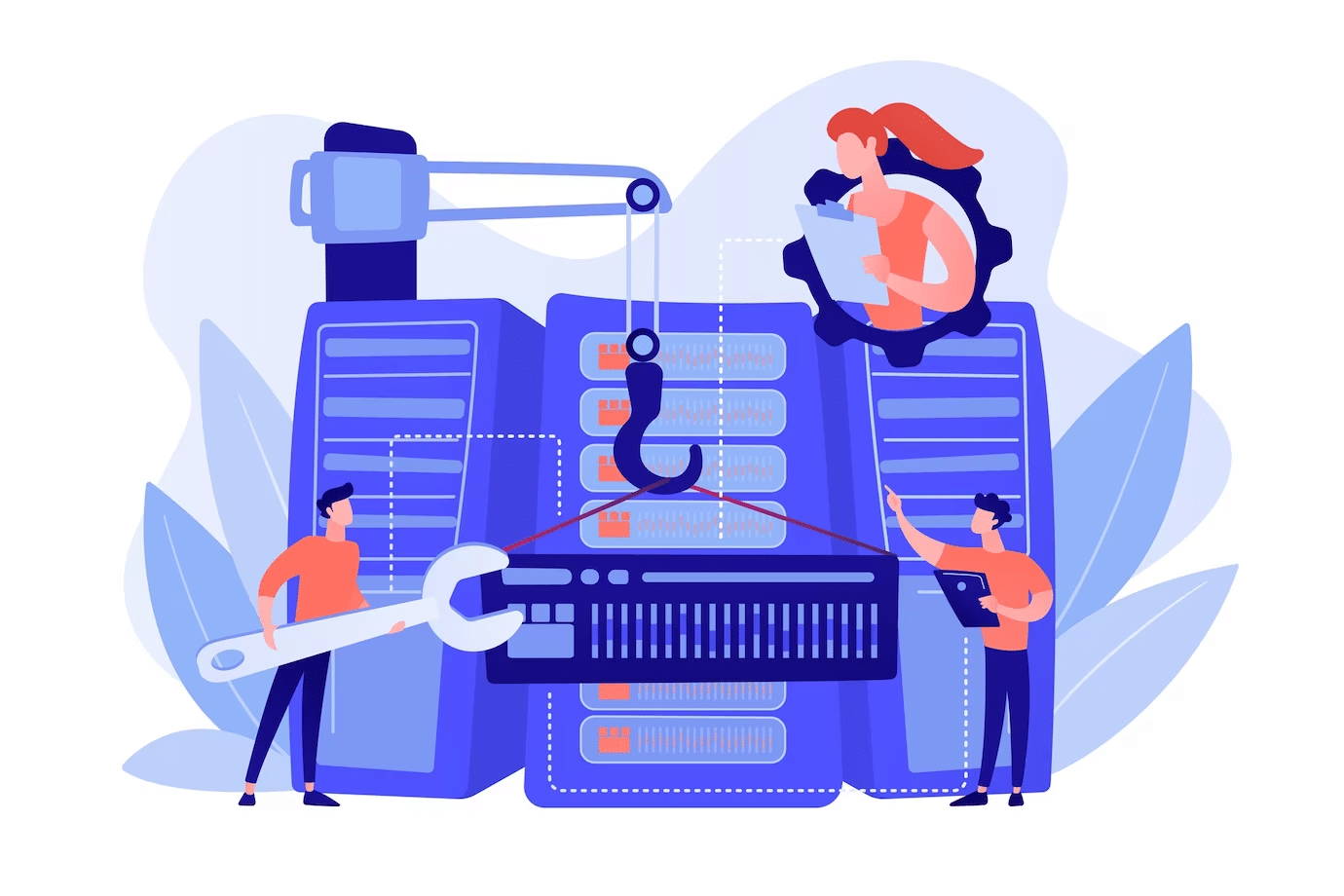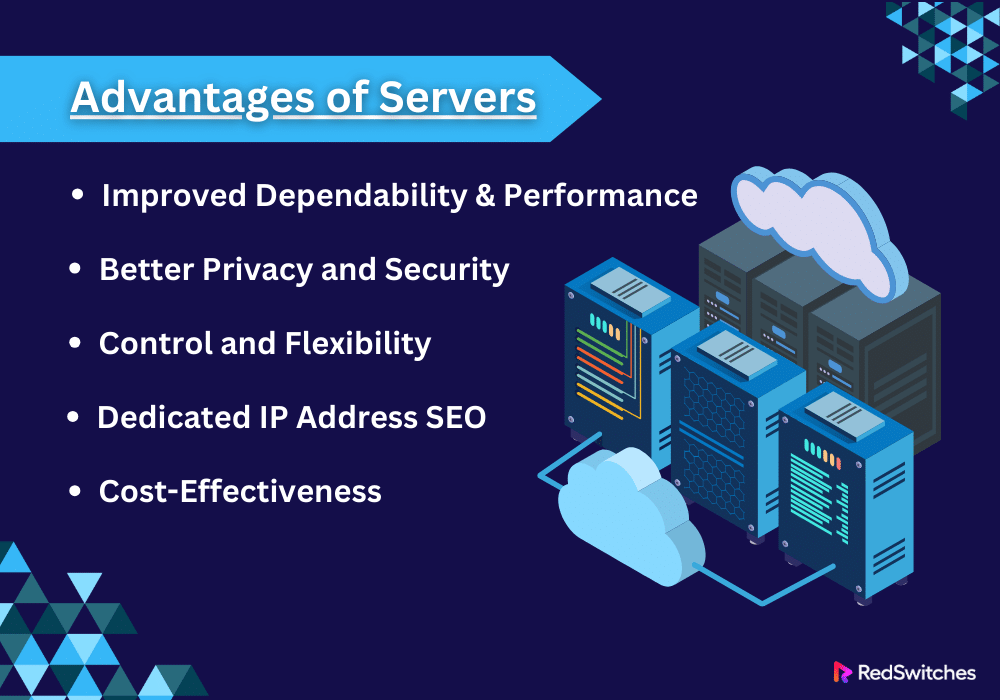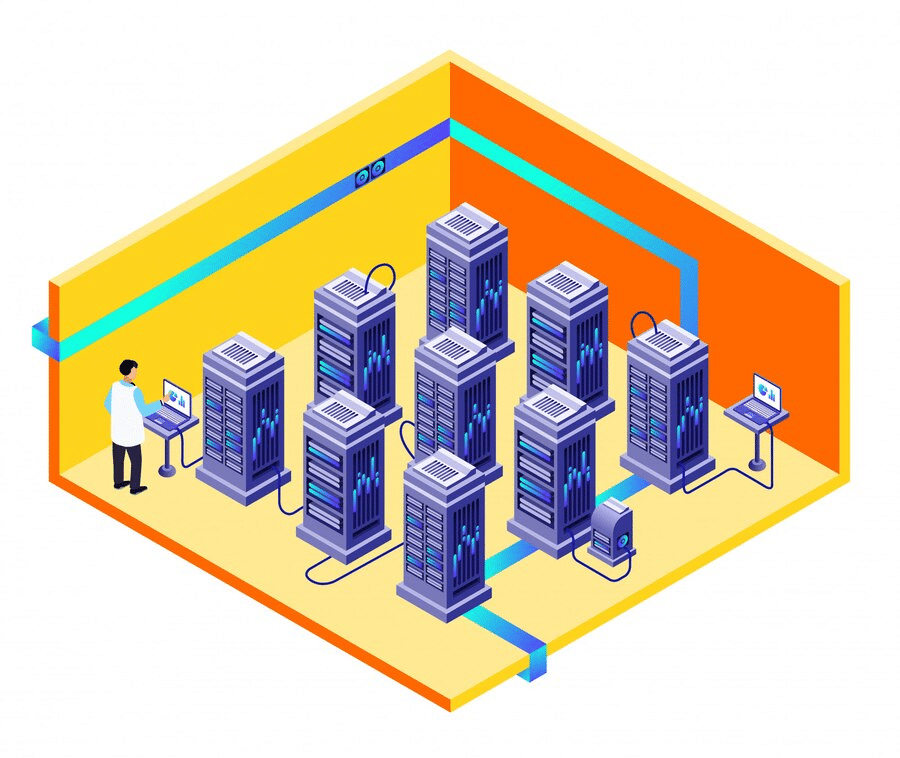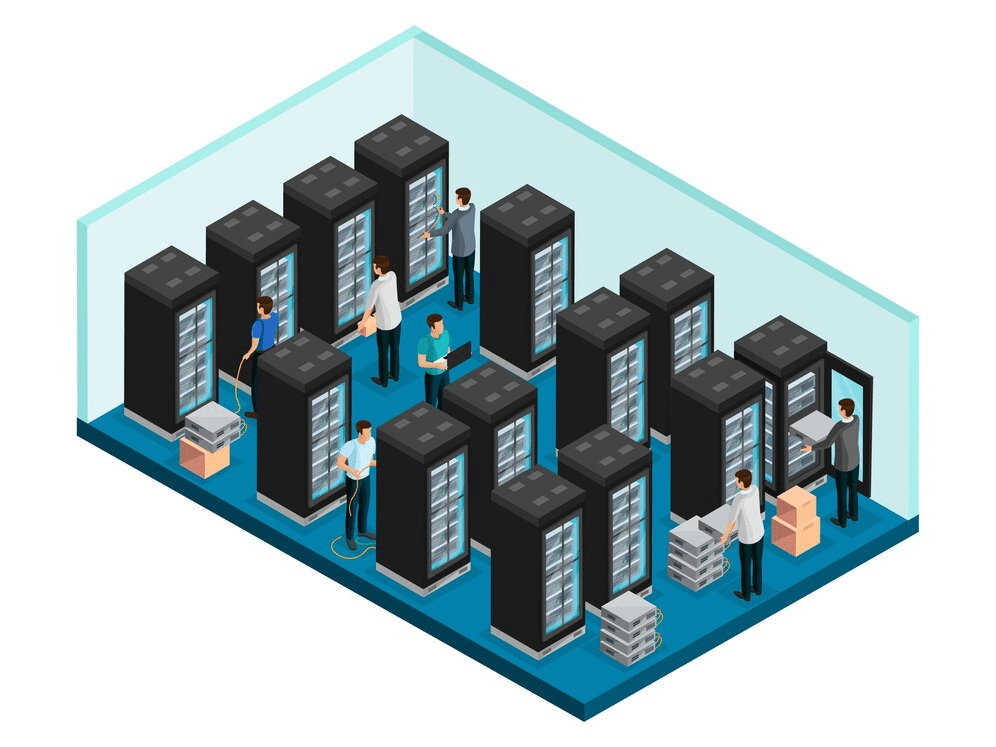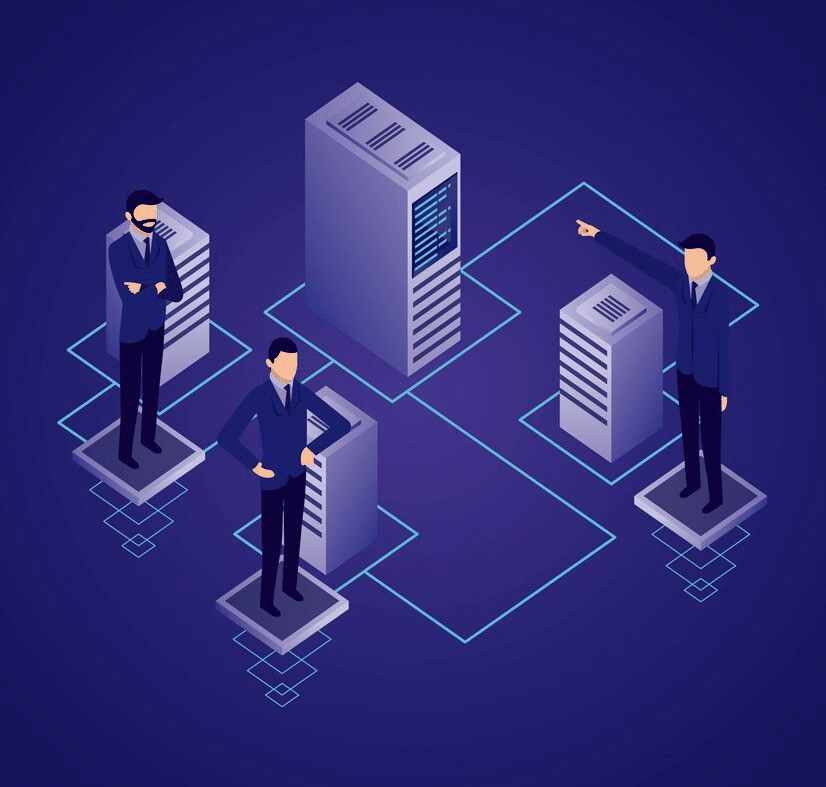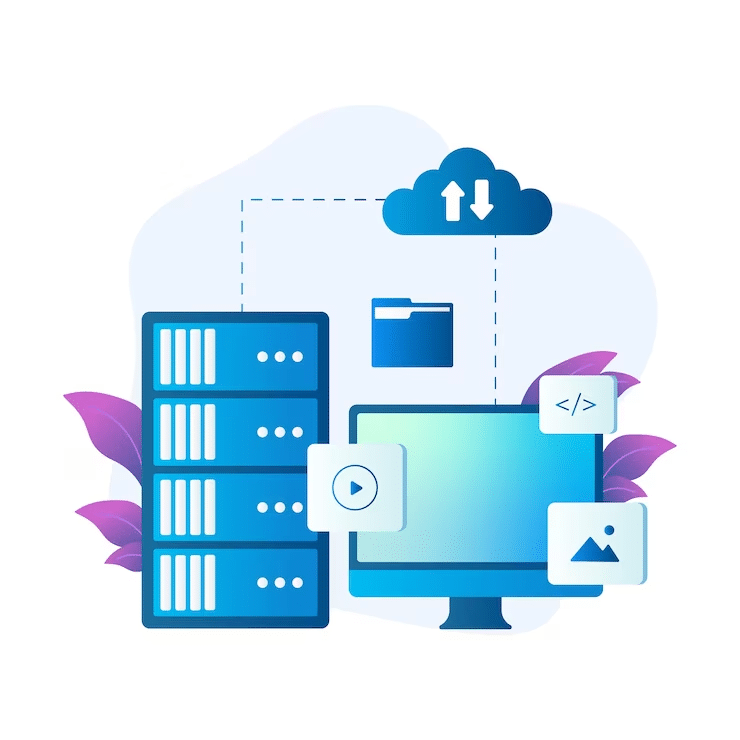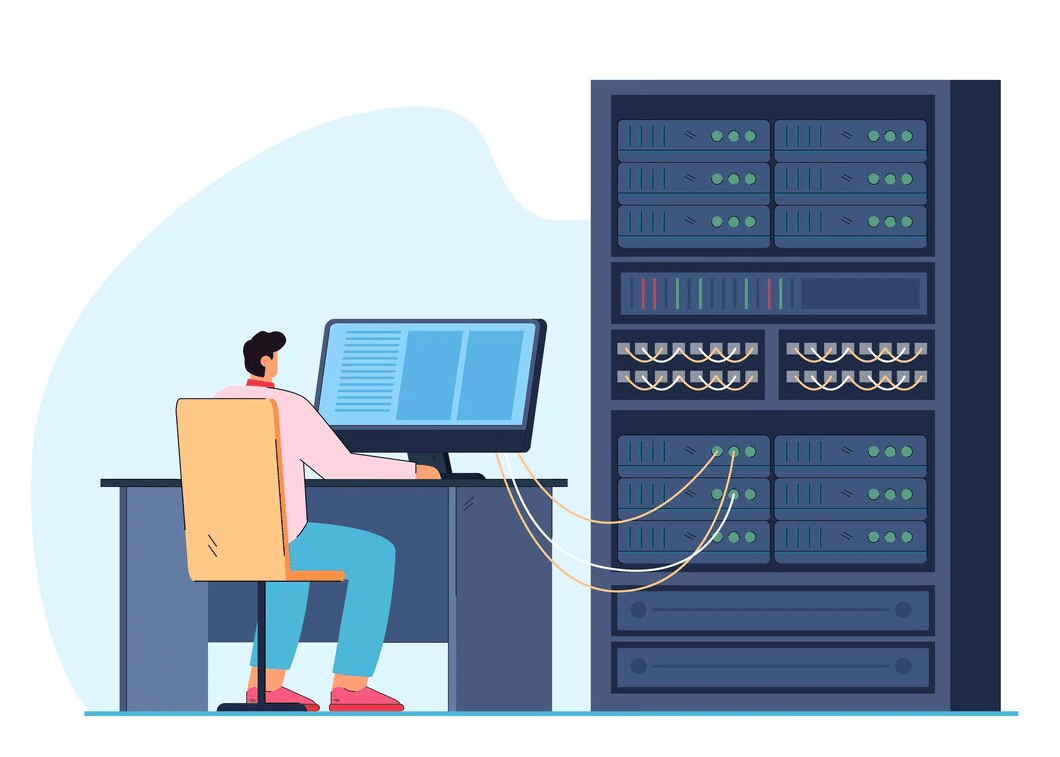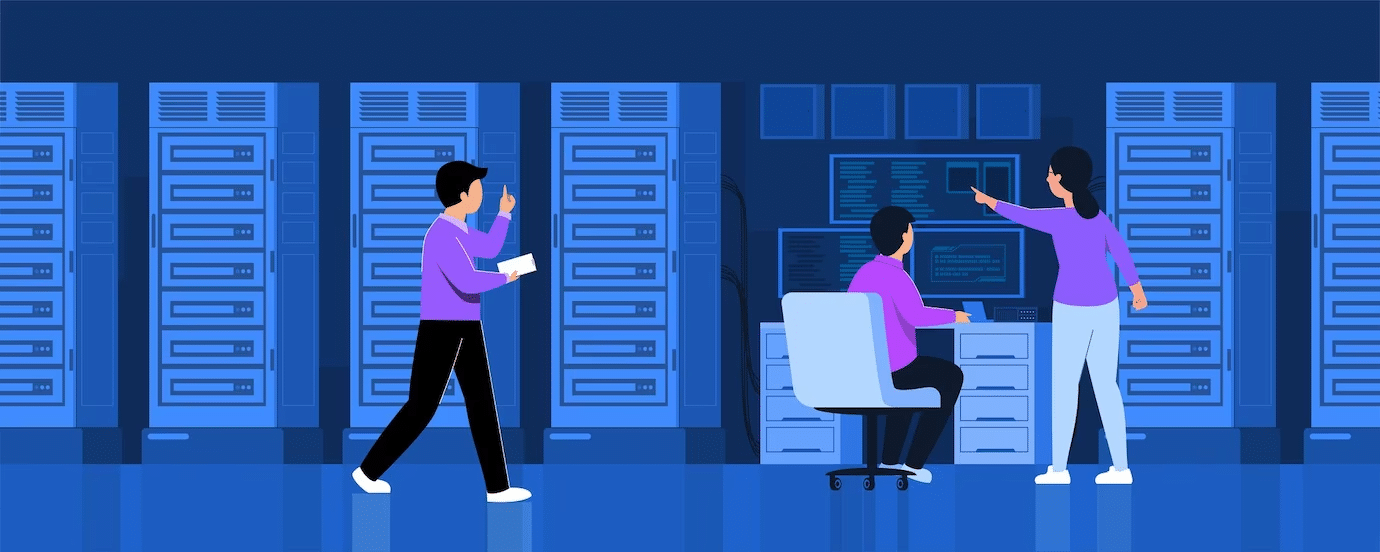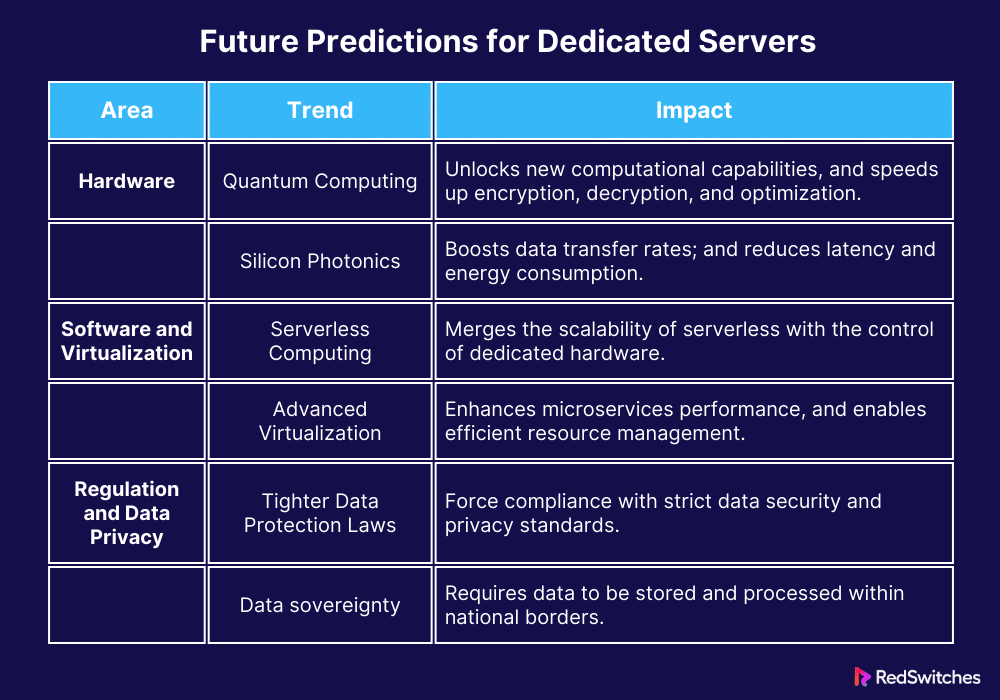Key Takeaways
- Servers provide unparalleled control, performance, and security for high-traffic websites.
- Significant improvements in hardware and software, including multi-core CPUs, SSDs, and modern operating systems.
- AI, IoT, and advancements in networking technologies like 5G and Edge Computing are revolutionizing server capabilities.
- With the increasing sophistication of cyber threats, servers are adopting advanced security protocols and AI-driven defenses.
- The shift towards green computing reflects a growing emphasis on sustainability.
- Industry-specific needs, regional trends, and the rise of cloud services and remote work influence the server market.
- Future developments, such as quantum computing and silicon photonics, promise to further enhance server capabilities and efficiency.
Dedicated servers are unsung heroes. They drive the internet’s backbone in the fast-changing digital world. Here, data is the new gold, and speed is the currency of success. The server market is seeing big changes. We are riding waves of new technology and shifting market expectations for Dedicated Server Hosting Market.
This blog looks at the trends and forecasts. They influence the growth of servers in the future. We explore what’s next, from integrating cutting-edge technology like AI and IoT to addressing urgent security and sustainability issues.
Come along as we explore the ideas and approaches shaping the next server phase. We will provide knowledge and insight into the systems that support the Internet.
Table of Contents
- Key Takeaways
- What are Dedicated Servers?
- Advantages of Servers
- Current State of Dedicated Servers
- Evolving Technologies Impacting Dedicated Servers
- Security Trends in Servers
- Market Dynamics and Future Demand
- Future Predictions for Dedicated Servers
- Challenges and Opportunities
- Conclusion
- FAQs
What are Dedicated Servers?
Credits: Freepik
In web hosting and online services, servers are a key technology. They offer strong, unique resources for companies, apps, and websites. One client only uses a server instead of shared hosting when resources are split among several users. servers have a unique mix of control, performance, and security. They are the go-to option for websites with lots of traffic, enterprises with big operations, and apps that need powerful processing.
A dedicated server is a physical server that an entity or person buys or leases to host services and applications. With this design, clients can fully change the server’s operating system, program installs, and settings. They can alter them to fit their needs. The server is dedicated. This leads to better dependability, stability, and performance. It happens because clients don’t share resources like CPU, memory, or storage with others.
Servers provide several benefits, especially regarding security and performance. The server has many resources. Customers can expect steady, fast performance. This is true even during peak traffic. This is especially important for websites and programs that handle large amounts of traffic or require a lot of processing power. servers also provide a better level of protection.
Also Read: What Is Dedicated Server and How Does It Work?
Advantages of Servers
Let’s discuss the advantages of Servers.
Improved Dependability and Performance
Exclusive Resource Use: Performance improves when all server resources are fully allocated to a single client. This exclusivity guarantees that, unlike shared hosting settings, your operations are unaffected by the traffic and activity of other users.
Customizability: Customers can modify the hardware and software settings of the servers to suit their unique requirements, maximizing performance for their workloads and applications.
Uptime: servers frequently have excellent uptime guarantees because they have a more solid infrastructure and less traffic. This reliability is essential for enterprises where server downtime can result in significant revenue loss.
Better Privacy and Security
Custom Security Measures: Clients completely control the security configurations on their server. This includes having the capacity to implement unique firewalls, security protocols, and other solutions suited to the company’s unique security needs.
Decreased chance of Cyber Attacks: Cross-infection from other websites is reduced because you’re not sharing space with potentially vulnerable neighbors, as in a shared hosting environment.
Data Isolation: When you have a server all to yourself, you can be more private and secure because your data is inaccessible to other parties.
Control and Flexibility
Credits: Freepik
Administrative Access: Clients have full control over software installations, server setup, and other aspects thanks to root or administrative access to their server.
Scalability: Growing business needs can be met by upgrading servers with additional RAM, CPU power, or disc space without switching to a new server.
Customizable Software Environment: Users can install programs, add-ons, or scripts to ensure the server environment is exactly what they need to run their business.
Dedicated IP Address SEO
If a nearby website on a shared server is penalized, a dedicated IP address can help your search engine results. It means that your IP is not shared with other domains.
Essential for Specific Uses: A dedicated IP address is necessary for some services and applications, especially those that deal with secure payments or SSL certificates for e-commerce websites.
Cost-Effectiveness
Servers cost more than shared hosting. But, they offer better performance, security, and uptime. So, they are a more affordable option for enterprises. Businesses can ensure they only pay for what they need. They can adapt as needs change with the flexibility to scale and customize.
Also Read: The Key Advantages of Dedicated Server Hosting for Businesses in 2024
Current State of Dedicated Servers
Credits: Freepik
The server industry is always changing. It is changing in response to the growing needs of the digital era. The demand for increased power, efficiency, security, and customization drives these improvements.
Let’s look closer at the state of servers today. This includes the important topics: the operating system and software. It also includes hardware advances, security measures and protocols, and market and user trends.
Hardware Developments
Significant advancements in server hardware have been made. They emphasize boosting processing power, using energy efficiently, and improving performance. Modern servers have multi-core CPUs. They provide record processing speeds and can handle many tasks at once. SSDs are more reliable and access data faster than HDDs. Servers complement this.
Enhancements to the Operating System and Software
It focuses on improving user experience and performance. Server software has become more adaptable and safe. Modern operating systems (OS) are more adaptable. They can be configured to meet companies’ unique security, stability, or speed needs. Applications are now deployed and managed in a completely new way thanks to containerization and virtualization technologies like VMware and Docker, making it easier to scale.
Also Read Exploring VMware Benefits Ideal for Virtualization
Security Procedures and Observations
Security is still the top priority, and servers are getting stronger defenses against online attacks. MFA, SSL certificates, and advanced encryption are now best practices. Modern intrusion detection/prevention systems (IDPS) and firewalls are more advanced and can stop sophisticated attacks.
User Preferences and Market Trends
Many user preferences and trends impact the server industry. Custom server solutions that address the demands of particular industries, such as gaming, streaming, big data analytics, and cloud services, are becoming increasingly popular. Servers with high uptime guarantees, scalability, and dependability are becoming increasingly popular.
Hybrid cloud systems are popular. They offer the best of both worlds: good performance and affordability. They reflect a desire for the flexibility of mixing servers with cloud resources.
Server technology has advanced tremendously. It now focuses on security, efficiency, and sustainability. Servers are well-positioned to meet the complex needs of the future digital environment. This is true as long as hardware and software keep improving and security strengthens.
Evolving Technologies Impacting Dedicated Servers
Credits: Freepik
Servers’ capacities and functions are changing. Breakthroughs are revolutionizing technology. The changes are led by advances in networking tech like 5G and Edge Computing. AI and Machine Learning are also key. So is the rise of the Internet of Things (IoT). These developments improve the effectiveness and performance of servers and create new opportunities for their use in various industries.
Also Read: The Evolution of Dedicated Servers in the Hosting Industry
The Development of Machine Learning and AI
AI and ML are revolutionizing servers. They are making them powerful tools for data analysis and decision-making. These technologies help servers to allocate resources better. They can also anticipate workloads and automate maintenance. This boosts productivity and cuts downtime. AI-driven algorithms may analyze Massive volumes of data in real time, which offer priceless insights and promote data-driven decision-making. Furthermore, AI and ML improve security measures by identifying and addressing threats faster and more precisely than with conventional techniques.
Internet of Things (IoT) integration
The Internet of Things is growing. It is creating a huge network of linked devices. They produce a massive amount of data. This data needs processing and analysis. servers, which provide the foundation for data processing, analysis, and storage, are essential to controlling this flood of data. By combining IoT with servers, businesses can achieve real-time device monitoring and administration, operational efficiency, and improved decision-making processes. This integration also necessitates strong security and data protection measures because there are more potential risks due to the rise in data points.
Technological Developments in Networking (5G, Edge Computing)
The function and purpose of servers are profoundly impacted by the rollout of 5G networks and the emergence of Edge Computing. 5G enables servers to support more bandwidth-intensive apps and services, like virtual reality (VR), augmented reality (AR), and real-time analytics. 5G offers faster data transmission speeds and lower latency. In the meantime, Edge Computing minimizes latency and bandwidth consumption by moving data processing closer to the location where the data is generated. This change requires a new generation of servers that can process and store data locally and are placed closer to network edges.
Also Read Mastering Latency Monitoring Effectively in 2024: A Detailed Guide
Green Computing and Sustainability
The green computing movement involves the server business. Environmental concerns are gaining prominence on a global scale. The goal of sustainability in servers is to reduce digital infrastructures’ impact on the environment. This is mainly done by using renewable energy and energy-efficient practices.
Hardware with Low Energy Consumption
An increasing number of servers are designed with energy efficiency in mind by manufacturers. This includes increased performance per watt CPUs lowering data centers’ overall energy usage. Further energy economy improvements are possible. They are made possible by innovations like dynamic voltage and frequency scaling (DVFS). It enables servers to change their power use in response to workload. Also, switching from HDDs to SSDs speeds up computers and saves energy. This is because SSDs use less power.
Bioenergy Resources and Information Centres
In the server market, the trend towards renewable energy is noteworthy. Major data center operators are powering their facilities with solar and wind energy. This action aligns with bigger business sustainability goals. It also reduces the carbon footprint from server operations. Additionally, the environmental impact of data center locations is being considered increasingly. Sites are chosen based on the availability of renewable energy sources. They are also chosen for the ability of the local climate to naturally cool buildings. This ability minimizes the need for artificial cooling.
Security Trends in Servers
Credits: Freepik
Cyber attacks are getting more sophisticated. The digital ecosystem is growing too. This growth is straining the limits of server security. Cyber defenders and attackers are in a never-ending arms race. They use cutting-edge tech to defend or exploit digital assets. New threats and vulnerabilities are being detected. Cutting-edge security technologies and protocols are being adopted. Artificial intelligence (AI) is being used to strengthen server security. These are a few key security trends from this dynamic environment.
Emerging Risks and Weaknesses
Cyber dangers have become more sophisticated in the digital age. They include ransomware, zero-day exploits, and DDoS assaults. They also include advanced persistent threats (APTs). The attacks are getting more sophisticated. They target weaknesses in server infrastructures. These weaknesses include bad networks, old software, and bad authentication. The proliferation of IoT devices has increased attack surface area and opened new avenues for security breaches.
Cutting-edge Security Protocols and Technologies
Technology and procedures aim to strengthen servers. They have greatly improved server security in response to these new threats. Protocols like TLS (Transport Layer Security) are being updated to improve data security in transit. So, encryption technologies have grown tougher. Similarly, data is also protected by hardware-based security features. These include HSM and TPM, which offer secure key storage.
AI’s Place in Server Security
AI is becoming increasingly important to server security. AI systems can use machine learning to find trends in data. They can anticipate attacks and automate the handling of security issues. This feature makes detecting complex cyberattacks that could evade conventional defenses possible. AI-powered security systems can respond to new threats faster than humans can. They always learn from the data they analyze to improve their tactics.
Market Dynamics and Future Demand
Credits: Freepik
Many factors affect the server market. These include industry rules, regional trends, and changes in cloud services and remote work. These factors work together to affect servers’ demand for and growth path. Therefore, stakeholders navigating this market must have a sophisticated grasp of it.
Specific Requirements for Servers per Industry
Different industries have unique needs for servers. This is because of their operational, regulatory, and technical requirements.
Financial Services: This industry needs high-performance servers. They must have low latency for secure transactions, real-time trading, and data processing. It’s also critical to adhere to strict legal data security and privacy requirements.
Healthcare: servers in healthcare must meet HIPAA. They also need to have strict data privacy and support telemedicine. Secure and reliable servers are vital. They are needed to manage sensitive patient data and provide essential medical services.
Gaming and entertainment: To give the best user experience, these sectors need servers with high bandwidth and low latency. They are for streaming services, online gaming, and content delivery networks (CDNs).
Technology and e-commerce: To give custom user experiences, servers must handle huge web traffic. They must also provide strong security for online transactions. And, they must support advanced data analytics and machine learning.
Regional Patterns in Server Requirements
Many factors impact the demand for servers. These factors include local regulations, economic development, and internet accessibility. They affect how servers are spread out.
Emerging Markets: E-commerce, digital finance, and online services are rising. This creates a greater need for servers in Asia, Africa, and Latin America. This is due to the rapid adoption of digital technology.
Data Sovereignty Laws: You need servers in regions with strict data residency rules to comply with data protection laws. For example, the European Union with its GDPR.
Technological Infrastructure: They are upgrading servers to accommodate 5G, IoT, and AI. These are advanced economies with established Internet infrastructure. This requires large expenditures in server capacity and capabilities.
The Effects of Cloud Services and Remote Work
The demand for servers has been greatly impacted. This is due to the rise in remote work and the broad use of cloud services.
Remote Work: More people work from home. They depend more on online platforms, VPNs, and collaboration tools. To enable these services, reliable, secure servers are needed. When designing servers, high availability and remote access must be prioritized so staff members can operate effectively anywhere.
Cloud Services: People still want servers. They need them for high performance, security, and control. This is true even though cloud computing offers scalability and flexibility. Hybrid solutions are gaining popularity. They mix servers’ security and performance with cloud services’ scalability. Using servers is for vital, high-performance applications. Cloud services are for variable workloads. This setup lets enterprises use the best of both worlds.
Future Predictions for Dedicated Servers
Credits: Freepik
In the future, big changes in hardware and software and a new regulatory environment will hit servers hard. These advancements will reshape the functions of servers. They will also reshape their use in many sectors.
Innovations in Hardware
Quantum computing: Quantum computers have much more power than traditional ones. They could completely change the computing industry.
Quantum processor integration might significantly improve servers’ capacity to carry out intricate computations, encrypt and decrypt data, and solve optimization issues at previously unheard-of speeds.
Even while it might still be years before quantum computing is widely used in servers for practical purposes, ongoing research, and experimental efforts point to a time when quantum-enhanced servers will handle currently unfeasible jobs.
Silicon Photonics: This technology greatly increases data transfer rates. It does so between components inside servers or between data centers. It uses light to transport data across optical fibers at high speeds. This technology helps servers. It can make them faster and more efficient. It does this by greatly reducing latency and energy usage. It is anticipated that as silicon photonics develops, servers will be equipped with it as standard equipment, enabling improvements in data-intensive applications such as artificial intelligence, big data analytics, and real-time processing.
Trends in Software and Virtualization
Serverless Computing: With an emphasis on creating code without worrying about the underlying server architecture, serverless computing is revolutionizing the deployment and management of applications. Although the idea of servers may appear contradicted by this trend, servers now have the chance to be optimized for serverless architectures. This implies that serverless tasks may be hosted on servers more frequently. This would allow for the control and security of dedicated server hardware to be combined with the scalability and efficiency of serverless computing.
Advanced Virtualization Technologies
Although virtualization is not a brand-new concept, its server uses are increasingly complex. Effective application deployment, management, and scaling are becoming simpler because of technologies like containerization (e.g., Docker, Kubernetes). In the future, servers will probably be built with native support for these technologies, providing improved performance for microservices and containerized applications and more adaptable and effective resource management.
The Changing Environment of Regulation and Data Privacy
Tighter Data Protection Laws: Governments worldwide are passing tighter data protection laws in response to growing worries about data security and privacy. This trend will probably impact the use and management of servers. Service operators must ensure that their hardware and software setups adhere to these standards, which may contain clauses on data encryption, audit trails, and particular data residency requirements.
A Greater Emphasis on Data Sovereignty
Data sovereignty—keeping data inside a nation’s borders—is becoming increasingly significant as data privacy becomes a more visible concern. Organizations will need servers to meet these criteria, raising the need for nation-specific server deployments and localized data center services.
Challenges and Opportunities
The dedicated server market is growing and innovative. But, it also has a distinct set of opportunities and difficulties. Companies and service providers need to manage these complications. They must do this to use dedicated servers in the digital era fully. Among these, striking a balance between cost and performance, closing the digital divide, and future-proofing for unanticipated requirements are crucial.
Finding a Cost-Performance Balance
Balancing cost and peak performance is a careful act. It’s a big challenge when deploying dedicated servers. Demanding applications require fast servers. They are expensive but have the newest processors, lots of memory, and quick storage. Costs are increased by energy usage, particularly in light of the trend towards more environmentally friendly activities.
Using energy-efficient technology and better server design can cut these costs. Innovations that cut energy use and lower operating costs are a key example. They include dynamic scaling. It modifies server resources in response to demand. Also, renewable energy and better cooling can cut the data center’s energy use and costs. Also, providers can benefit from buying gear in bulk at a discount. They can then pass those savings to customers.
Resolving the Digital Gap
The equal sharing of server benefits is hurt by the “digital divide.” This is the gap between people with easy access to digital tech and those without it. People without access to high-performance computing are becoming increasingly disadvantaged as more services and apps depend on it.
A key strategy to close this gap is to extend the infrastructure of dedicated servers. This will bring them to underprivileged communities. Governmental initiatives promoting investment in rural and low-income urban regions can help to spread this. Furthermore, advancements in wireless and satellite technology might be able to connect isolated areas, leveling the playing field and improving accessibility to dedicated server services.
Preparing for Unknown Needs in the Future
Because of the speed at which technology is developing, it is difficult to create dedicated server solutions that will be useful and efficient years from now. Forecasting the requirements of applications and services is intrinsically challenging, particularly in light of the advent of technologies like AI, IoT, and quantum computing.
Using scalable and modular server architecture makes them easy to upgrade and modify. It does so as requirements evolve. This method allows companies to expand their networking, storage, or processing. They can do this without fully rebuilding their infrastructure. Investing in R & D(research and development) and keeping up with technology also help server providers. They can adjust to changing needs quickly. Another tactic is using technologies like virtualization and containerization, which may abstract hardware dependencies. This makes it simpler to move services and apps to newer, more powerful servers as they become available.
Conclusion
In conclusion, the market needs to change. So does tech. Also, cybersecurity grows in importance. These things drive the fast change in the server industry. As we’ve seen, servers are vital for companies. They help companies stay ahead of the competition in the digital era. Servers offer unmatched performance, security, and customization. Selecting a reputable and progressive server provider is more important than ever as these trends develop.
RedSwitches is useful in this situation. We are dedicated to providing scalable, secure, and fast dedicated server solutions. This puts us in a prime position to help companies navigate the challenges of the digital age.
You may want to use the newest server hardware, set strong security, or future-proof your digital assets. RedSwitches has the know-how and infrastructure to turn these obstacles into opportunities. We will ensure your online presence not only continues but flourishes.
FAQs
Q. Why are servers the future of hosting?
Servers are the best option for any future hosting requirements since they provide unmatched performance, security, and customization.
Q. Why choose a server?
Selecting a server enables customized control and resources, maximizing security and performance for particular requirements.
Q. Is a dedicated server faster than a shared one?
Indeed, because dedicated resources are available and other users’ activities do not interfere, dedicated servers are usually quicker than shared ones.
Q. What is dedicated server hosting?
Dedicated server hosting is a type of hosting service where a client rents an entire physical server that is not shared with anyone else.
Q. How does dedicated hosting differ from shared hosting?
Dedicated hosting provides an entire server for one client, while shared hosting involves multiple websites sharing resources on the same server.
Q. What are some security measures for dedicated servers?
Security measures for dedicated servers include regular updates, firewalls, antivirus software, encryption, and monitoring for suspicious activities.
Q. What is the global market trend for dedicated server hosting?
The global dedicated server hosting market is expected to grow due to the increasing demand for dedicated hosting services and the need for more secure and reliable hosting solutions.
Q. How do virtual private servers compare to dedicated servers?
Virtual private servers (VPS) share physical server hardware but have dedicated resources allocated to each client, whereas dedicated servers offer exclusive use of the entire server.
Q. How can I choose the right dedicated server for my needs?
When choosing a dedicated server, consider factors such as your hosting needs, technical requirements, budget, scalability, and the level of management and support the hosting provider provides.
Q. What is the demand for dedicated server hosting?
There is a growing demand for dedicated server hosting due to increased security concerns, higher traffic volumes, and the need for greater control over server resources.

